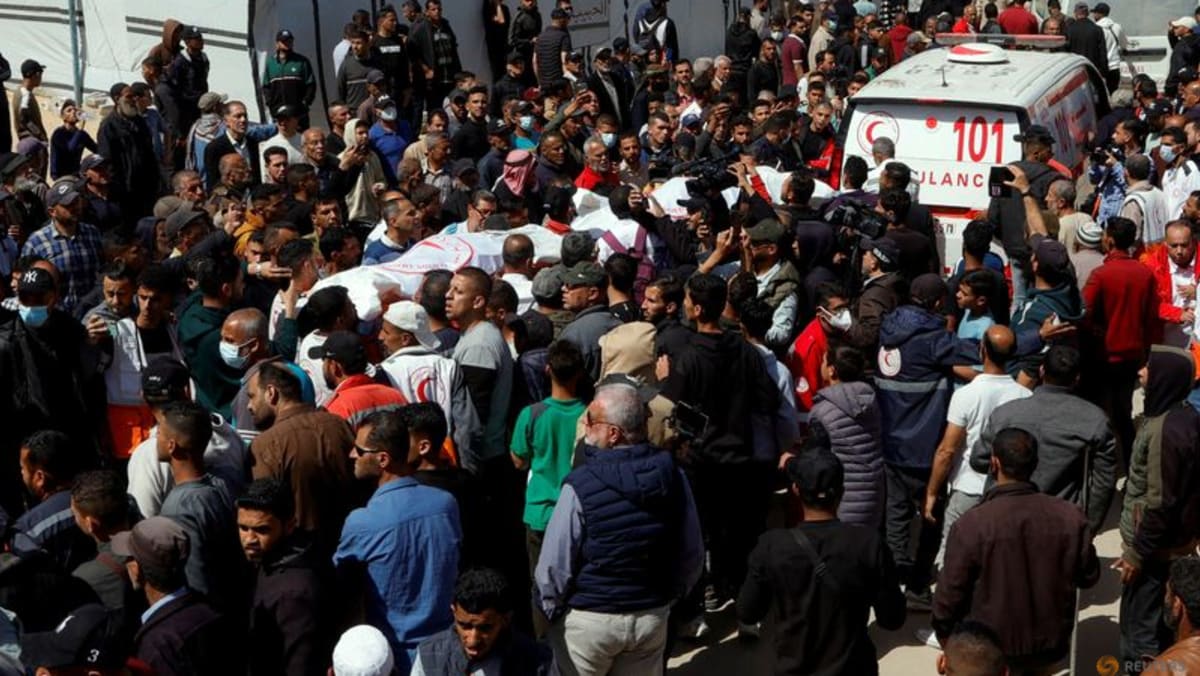“It is unfortunately UNRWA and others, and the World Food Program is another one, who simply spend their time perpetuating this conflict rather than pulling their finger out and actually doing the job which they were designed to do. Stop blaming Israel,” he said.
The remarks are part of a chorus of attacks on the United Nations and its secretary general by Israeli officials in recent weeks. Mencer added that “we must stop this halo around the United Nations of their being a force for good. Unfortunately, in many, many cases, they are not a force for good.”
But aid groups say it has become increasingly dangerous and difficult to distribute aid in Gaza amid the ongoing military operation in the south, shortages of vehicles and fuel, and an increase in attacks against aid trucks by desperate civilians and criminal gangs. The United Nations has consistently accused Israel of holding up deliveries through onerous checks and restrictions, as well as lack of coordination with their agencies.
GET CAUGHT UP
Stories to keep you informed
The WFP on Tuesday backed the findings of the latest Integrated Food Security Phase Classification (IPC) analysis, which said a “high risk” of famine “persists as long as conflict continues, and humanitarian access is restricted.”
The IPC analysis found that about 500,000 Palestinians are on the brink of starvation. The WFP said the IPC findings aligned with its own concerns “about the ongoing levels of severe hunger across the Gaza Strip.”
The situation has become “increasingly intolerable,” U.N. spokesman Stéphane Dujarric said in a news briefing Tuesday. More than 200 humanitarian workers have been killed since the war broke out, and humanitarian operations “have repeatedly been in the crosshairs in Gaza,” he said.
Mencer in the briefing Wednesday implied without providing evidence that “many” of the aid workers who have been killed were working with militant groups in Gaza.
Israel has repeatedly stressed that it is allowing hundreds of trucks to enter southern Gaza daily. In a tweet Tuesday, Coordinator of Government Activities in the Territories (COGAT) claimed there were “no looting or security concerns, only a lack of motivation.” But aid workers say the security situation has impeded their efforts to actually distribute the aid.
U.N. officials made contact with Israeli authorities in recent days to demand that they better protect aid workers and facilitate the entry of more humanitarian aid into Gaza, Dujarric said.
The U.N. undersecretary general for safety and security, Gilles Michaud, discussed the situation with COGAT this week, according to Dujarric. That conversation was preceded by a letter on June 17 from Muhannad Hadi, the resident U.N. official coordinating Gaza aid. Dujarric declined to describe Israel’s response.
As The Washington Post previously reported, the United Nations has told Israel that it may not be able to continue in its role as principal provider of aid inside Gaza if the security situation for humanitarian workers does not improve.
Dujarric said Tuesday that the United Nations is continuing to deliver aid where and when it can, and, when asked, did not directly address a report by the Associated Press that senior U.N. officials told Israel it would suspend operations if Israel did not do more to protect aid workers.
“I’m not talking about suspending operations,” Dujarric said. “The way forward is not a mystery. … It’s on the table, it’s a humanitarian cease-fire. It’s the free and unhindered flow of humanitarian aid throughout the Gaza Strip. It’s the immediate and unconditional release of all the hostages.”
Here’s what else to know
A group of prominent Israelis said Congress made “a terrible mistake” in inviting Israeli Prime Minister Benjamin Netanyahu to speak. The group, which includes former Israeli prime minister Ehud Barak, wrote in an editorial published by the New York Times that the invitation for Netanyahu to address a joint session of Congress on July 24 “will reward his scandalous and destructive conduct toward our country.” The group said Netanyahu “has failed to come up with a plan to end the war in Gaza” or to release all of the hostages, and has shown “contempt” for a U.S.-led proposed peace plan.
Rep. Jamaal Bowman (D-N.Y.) lost his reelection bid in a Democratic primary race dominated by debate over Israel and Gaza. Bowman, who has long been critical of Israel’s treatment of Palestinians, angered some Jewish constituents and attracted the ire of local and national pro-Israel groups when, in the immediate aftermath of the Oct. 7 massacre, he called for a cease-fire and accused Israel of genocide. Westchester County Executive George Latimer, Bowman’s opponent in the primary for New York’s 16th Congressional District, received significant financial backing from the American Israel Public Affairs Committee. The race was the most expensive House primary in history.
At least 37,718 people have been killed and 86,377 injured in Gaza since the war started, according to the Gaza Health Ministry. It does not distinguish between civilians and combatants but says the majority of the dead are women and children. Israel estimates that about 1,200 people were killed in Hamas’s Oct. 7 attack, including more than 300 soldiers, and it says 314 soldiers have been killed since the start of its military operations in Gaza.
Karen DeYoung, Colby Itkowitz, Louisa Loveluck, Jennifer Hassan and Sarah Dadouch contributed to this report.



















Discussion about this post